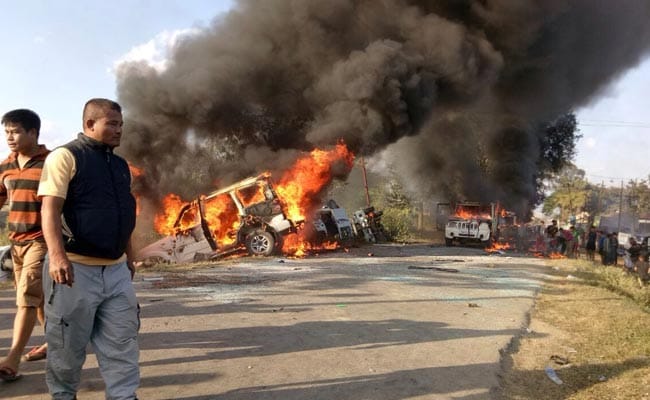Manipur Records Highest Violent Crimes and Rioting Cases in the Northeast in 2023
In 2023 Manipur saw a dramatic spike in recorded violent crime: the National Crime Records Bureau (NCRB) reports 14,427 violent crimes, a huge jump from just 631 in 2022. The year also saw massive rises in rioting and arson, and Manipur recorded 3,339 crimes — up from virtually none a year earlier. These figures map directly onto the prolonged ethnic conflict that began in May 2023 between valley-based Meiteis and hill-based Kukis, which led to deaths, mass displacement and widespread property destruction across the state.
- 14,427 violent crimes recorded in 2023 (compared to 631 in 2022).
- 3,339 crimes against Scheduled Tribes in 2023 (compared to 1 in 2022 and none in 2021).
- 5,421 incidents of rioting and 6,203 cases of arson reported.
- Official tallies also recorded 151 murders and 818 attempted murders, along with large numbers of robbery and dacoity incidents.
- Since May 2023 more than 260 people lost their lives and thousands were displaced (humanitarian impact connected to the same conflict).
- It also documented 89 kidnappings and 27 rapes.
FAQs
Q1: Were the NCRB numbers for Manipur in 2023 based on improved reporting or actual violence?
A1: While improved reporting can influence data, the scale and nature of the increases — notably a jump to 14,427 violent crimes, thousands of rioting and arson incidents, and 3,339 crimes against Scheduled Tribes — correlate with documented, large-scale ethnic conflict that began in May 2023, indicating actual increases in violence rather than reporting artifacts alone.
Q2: Which crime categories rose the most in Manipur in 2023?
A2: Rioting and arson showed the most dramatic increases, with 5,421 incidents of rioting and 6,203 arson cases reported in 2023, alongside new large numbers of crimes specifically targeting Scheduled Tribes.
Q3: How many people were killed or displaced during the 2023 unrest?
A3: Official reporting around the period cites more than 260 deaths related to the violence and thousands of displaced people forced into relief camps — the human costs behind the NCRB’s crime tallies.
Q4: What immediate policy priorities should the state focus on?
A4: Immediate priorities include securing affected areas, documenting and investigating major crimes, scaling humanitarian relief for the displaced, establishing psychosocial support, and launching transparent reparations and reconstruction programs — all while initiating inclusive political dialogue to address root causes.
Q5: How can ordinary citizens and NGOs help in the recovery?
A5: Citizens and NGOs can help by documenting abuses, providing legal and psychosocial support to victims, facilitating inter-community dialogue, assisting with livelihood restoration and holding institutions accountable for fair and efficient relief and reconstruction. Local civic engagement is essential to rebuild trust.


